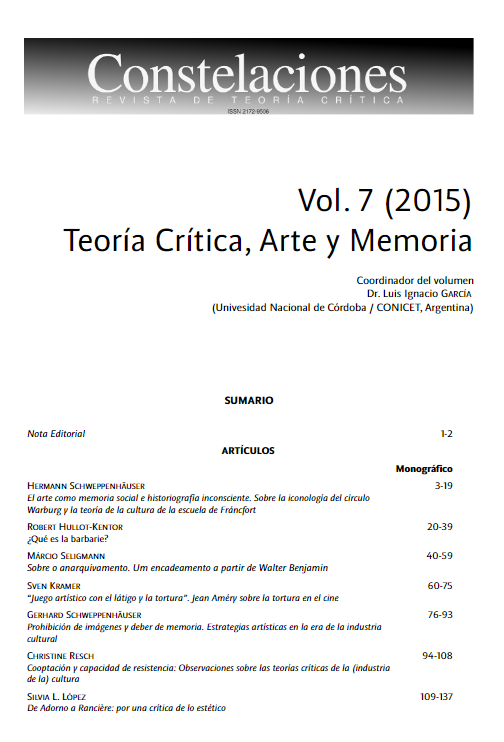No. 7 (2015): Critical Theory, Art and Memory

It can be said that the problem of the relationship between art and memory experienced a Copernican revolution when Theodor W. Adorno wrote, in the immediate aftermath of World War II, a phrase which is as commonly cited as misinterpreted: “To write poetry after Auschwitz is barbaric”.
Regardless of the way in which it has been interpreted, what is certain is that the phrase refers to the possibility of art itself. Uttered as a provocation against the “resuscitated culture”, Adorno’s sentence established an unavoidable critical basis, according to which the link between art and memory begins to operate as one of the privileged approaches to the criticism of the present. The Adornian dictum also pointed towards one of the fundamental ideas of the tradition of Critical Theory, even before the abysmal problem of Auschwitz: the question of the link between culture and barbarism, formulated from a tradition of critical thinking that always regarded art as scenario and testimony of the utopia and the catastrophe of the century.
Meanwhile, recent decades have, for multiple reasons, once again brought to the forefront the problem of memory and its relation to art, mass culture or past-representation policies. Today, however, the relationship between art and memory seems to constitute a normalized academic field (transformed into “memory studies”) and a theme at risk of becoming a mere decoy for reconciliation policies (the posing of a certain “memory” as a national reconciliation strategy). For this reason, the main objective is the assessment of persistent unresolved tensions in this field.
For Critical Theory, art and memory were two crucial driving forces behind a non-reconciled thought for which injustice and violence have always emerged victorious. To critically analyze the relationship between art and memory from a Critical Theory perspective therefore implies questioning not only the ways in which art can give an account of that past that is always occurring but also the way in which consummated barbarism determines the status of art itself not just the art that has that traumatic past as an object.
Critical Theory entrusted art with the responsibility of being the memory of socially-produced suffering, even before Auschwitz. But it did not do so by presenting it as a place of reconciliation for a fractured national memory, nor as a melancholic place where politics may be transformed into an ethics of acquittal. On the contrary, art was the place of exposition to the irreconcilable and, therefore, the fundamental energy reserve of neutralised political energies. The testimony of catastrophe intrinsically intertwines with the promise of worldly happiness and with the struggle to subvert the destiny engraved in social fate.
To think of the relationship between art and memory from the point of view of Critical Theory means thinking of the horror past and present not from the sad stance produced by consummated barbarism but from the indomitable tension between catastrophe and the necessary transformation of society. More so when capitalism’s destructive nature is claiming ever-growing human sacrifices, all but muting both art and thought.
On this basis, contributions linked to any of the following themes will be welcomed:
- Art, between the memory of suffering and the promise of happiness.
- Modernism, cultural industry and the dilemmas of the representation of horror.
- Art and the destructive nature of capitalism.
- Art and affirmation: the aestheticization of social reality and the forgetting of suffering.
- Beyond the “ethic turn”: art and memory between ethics and politics.
- Art “after Auschwitz” and the problem of “the end of art”.
- Critical Theory, history and memory of the victims: art, memory, narration.
- Critical Theory, psychoanalysis and trauma: anachronisms of memory and temporalities of art.
- Memory and utopian thought: past futures. Art and the problem of temporality.
- Mutations of the sublime: image prohibition, vanguards and concentration-camp barbarism.
- Art, memory, and aporiae of “the unrepresentable”.
- Art theory, politics of memory and criticism of capital.
Associate editor
Dr. Luis Ignacio GARCÍA (Universidad Nacional de Córdoba / CONICET, Argentina)




